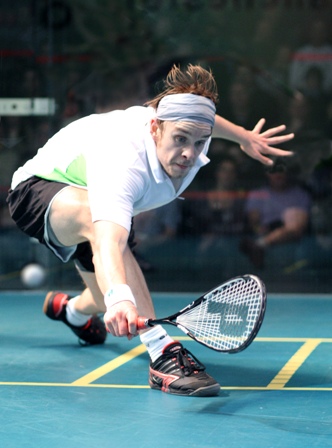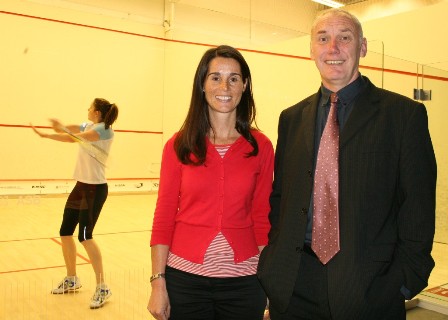
James Wilstrop in full flight against typecasting
The coaching road to success
In October 2007 The Leisure Review visited the British Open at the National Squash Centre to see how middle England’s favourite game – thirty years ago at least – was faring in the pre-Beijing climate. This October with Team GB’s medallists parading through the capital Mick Owen returned to Manchester to see what had changed in twelve months.

James Wilstrop in full flight against typecasting
It may have been just serendipity that meant I was parking the same car in the same car park twelve months on from my last visit to a major squash tournament but with even commercial radio enthusiastically reporting live from Trafalgar Square it felt like fate. In the intervening time there have been some changes. First and foremost the event on offer this autumn is the Hi Tec World Championships; same space-age court, very similar list of players but a step up in class. Simple things spoke of a more professional approach: the entrance had a weather proof, branded-up vestibule added and the accreditation process required a photograph; the volunteers were tricked out head to foot in Hi Tec stash; and the seating surrounded the court, so that even in the VIP dining area – another up-grade – it was impossible to monitor the court while munching on a salmon and rocket pannini. Everything was that bit more classy and, without the distraction of masters’ events on the back courts, the focus was very much on the main stage and the job in hand, finding a world champion.
There have been changes beyond the venue as well: massive success in Beijing for one, the emasculation of Sport England for another. The former may have driven sport even further up the political agenda and the latter may have resulted in more cash for governing bodies (at least temporarily) but for sports such as squash the pressure to get on the Olympic roster has only been exacerbated. With profile-greedy politicians informed by a lazy national media, sports such as athletics, despite a growing record of under-achievement, will continue to enjoy status and support conferred in times past; and sports that cannot grab the attention and hold it will slip from the minds of the funders. Squash may yet come to yearn for the days before performance-related pay if ‘performance’ morphs into ‘Olympic performance’ or even just ‘high-profile performance’.
And there have even been changes in your correspondent’s perspective. Since last autumn, racketball, which is squash for the halt and the lame, has entered my life and TLR Communications Limited – this magazine’s alma mater – has been rewriting the candidate resource for the UKCC Level 3 in Coaching Squash. As the company’s coaching correspondent, that means my awareness of the finer points of the two-wall boast, the physiological demands of tournament play and the importance of the player’s ‘tree’ has risen to an unlikely level. The ‘squash job’, as its called in the office, is a project aimed at turning a mish-mash of more than twenty articles and papers which cover the Level 3 syllabus into a coherent resource that looks, and more importantly sounds, as if they all came from the same keyboard. It is painstaking work as it involves getting commas, subjunctives and T Zones consistently in the right place but the end product is intended to be a part of the UKCC revolution so its needs to be right. In the words of the UKCC itself, we are all “building a clear career structure for coaches within a professionally regulated vocation [so] we need to ensure that all the constituent parts are professionally produced and delivered”. In our small corner of the coaching revolution we are proudly doing our bit. But will it ever really have an affect at the sharpest of sharp ends – in the World Championships?
Level 3 coaches should be competent “to plan, implement and analyse long-term development programmes” and they can expect to be working with county-standard players or better; which means players like Sarah Kippax – a local lass who just squeezed into the main draw as a qualifier – a few years ago. Despite her early exit from the competition, Sarah hadn’t taken her bat and ball home. Instead, in lieu of a coach, she was providing support and advice to Northern Ireland’s Madeline Perry, who upset the seedings to beat New Zealander Shelley Kitchen. The Kiwi had a coach, a chap who seemed to be using a variety of motivational approaches and offering both technical and tactical advice. However, she still got beaten. Which brought England’s top boy James Wilstrop to the stage – accompanied by a man wearing a tracksuit and liberally dispensing advice.
The local hero had clearly decided to conserve energy in his second-round encounter with Davide Bianchetti, an Italian who seemed to have arrived direct from central casting, and he went about his business quietly. In contrast, Bianchetti produced the full gamut of gesture and referee-focused remonstration throughout the encounter, with Wilstrop’s only contribution to debate being a raised eyebrow when given a let he hadn’t asked for and a shake of the head when Bianchetti was docked a penalty point for racket abuse to give the Englishman match point. Between games, while his coach talked constantly, James – the crowd it seems were all on first name terms with him – walked up and down wrapped in his own thoughts. During play he did the needful to get points and little more which, despite Bianchetti being the best Italian squash player ever, was not often. At only one point did Wilstrop show any real interest in proceedings. At 9:8 down in the second game he took a deep breath and changed gear from languid to lightning. From the gallery, let alone from on the court, it seemed impossible to process his range and quickness, and with three whirlwind points he took the game.
Unfortunately James did not last a lot longer in the competition; in the very next round he fell prey to former winner of the world crown, David Palmer from Australia, the only non-Egyptian to make the semi-final draw. Dave Brailsford, guru of British Cycling, is reported to have said: “If we ran an experiment involving a set of athletic triplets of identical ability and placed one in Australian Cycling, one in German Cycling and one in British Cycling, we have a high degree of confidence that our programme would produce the best result at this moment in time.” Clearly his equivalent at Squash Egypt might justify a similar boast but how far from the truth is it for squash in the UK? We know that throughout the sport people are working on Brailsford’s famous “aggregation of marginal gains” (and some of us have even contributed the odd adjectival paraphrasis to the cause) but without some heavy duty profile-building and commensurate political support it is hard to see James Wilstrop or even Sarah Kippax riding on a float through the streets of London.
The Leisure Review, November 2008
© Copyright of all material on this site is retained by The Leisure Review or the individual contributors where stated. Contact The Leisure Review for details.
